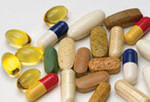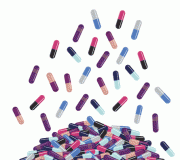Use Of Medication For Insomnia Or Anxiety May Increase Mortality Risk,...
Taking medications to treat insomnia and anxiety increases mortality risk by 36%, according to a study conducted by Geneviève Belleville, a professor at Université Laval's School of Psychology. Details of the study are published in the latest edition of the Canadian Journal of Psychiatry.
Doctors Often Overprescribe Antibiotics For Respiratory Infections, Pennsylvania Study Finds
Doctors frequently misuse antibiotics when treating patients hospitalized with respiratory tract infections (RTIs), according to a study to be published in the November issue of Infection Control and Hospital Epidemiology.
Powerful Free Radical Causes Lung Damage From Oxygen Therapy
The most toxic free radical appears responsible for much of the lung damage that can result from oxygen therapy in the critically ill or injured, Medical College of Georgia researchers report. Within just a few days, ventilators and oxygen chambers used to significantly increase oxygen levels can also dramatically increase levels of peroxynitrite, an oxidant powerful enough to break down DNA and cause proteins to malfunction, said Dr. Yunchao Su, pharmacologist in the MCG Schools of Medicine and Graduate Studies.
No Standard For The Placebo?
Much of medicine is based on what is considered the strongest possible evidence: The placebo-controlled trial. A paper published in the October 19 issue of Annals of Internal Medicine -- entitled "What's In Placebos: Who Knows?" calls into question this foundation upon which much of medicine rests, by showing that there is no standard behind the standard -- no standard for the placebo.
Putting A Bull’s-Eye On The Flu: Detailing Influenza’s Structure For Drug...
Beating the flu is already tough, but it has become even harder in recent years -- the influenza A virus has mutated so that two antiviral drugs don't slow it down anymore. Reporting their findings in the journal Science, researchers from Florida State and Brigham Young move closer to understanding why not, and how future treatments can defeat the nasty bug no matter how it changes.
Antibiotics Have Long-Term Impacts On Gut Flora
Short courses of antibiotics can leave normal gut bacteria harbouring antibiotic resistance genes for up to two years after treatment, say scientists writing in the latest issue of Microbiology, published Nov. 3.
US, China Biggest Culprits As Report Finds 25% Of EU Supplements...
New research has highlighted rising rates of supplement contamination in the European Union – typically by steroids – with the US and China the main sources. The report published in Food And Chemical Toxicology found enforcement actions were lacking in the EU and called for greater scrutiny of the sector, to stem a problem they measured at 25 per cent of EU.
Drugs Can Pass Through Human Body Almost Intact: New Concerns For...
When an antibiotic is consumed, researchers have learned that up to 90 percent passes through a body without metabolizing. This means the drugs can leave the body almost intact through normal bodily functions.
It’s Enough To Give You Heartburn.
Wonder drugs they may be, but PPIs are overprescribed and pose some health risks. In the arms race against heartburn, one class of drug outperforms the competition by going straight to the source. The proton pump inhibitors, PPIs for short, block acid manufacture at the subcellular level.
FDA Cracks Down On Tainted Dietary Supplements
Manufacturers who put tainted or undeclared ingredients into dietary supplements were warned Wednesday by the Food and Drug Administration that they can no longer market them as such. The FDA has received reports on well over 100 products over the last few years, a number of them detailed serious injuries, even deaths. In fact, since 2007 the agency has sent out consumer alerts about 300 adulterated products.
Acid Suppressive Medication May Increase Risk Of Pneumonia
Using acid suppressive medications, such as proton pump inhibitors and histamine2 receptor antagonists, may increase the risk of developing pneumonia, states an article in CMAJ (Canadian Medical Association Journal).
Placebos Work — Even Without Deception
For most of us, the "placebo effect" is synonymous with the power of positive thinking; it works because you believe you're taking a real drug. But a new study rattles this assumption. Researchers at Harvard Medical School's Osher Research Center and Beth Israel Deaconess Medical Center (BIDMC) have found that placebos work even when administered without the seemingly requisite deception.


















